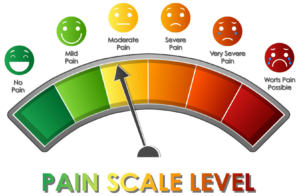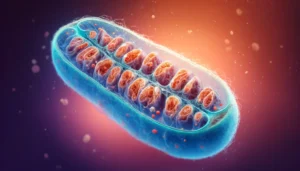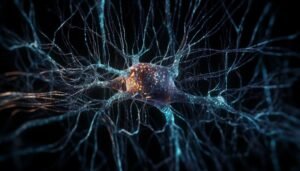Keto Diet for Chronic Pain
In recent years, the keto diet for chronic pain has gained significant attention as a potential therapeutic strategy. The ketogenic diet, known for its low carbohydrate and high-fat composition, can be an effective way to manage chronic pain.
This article explores the benefits of the keto diet for chronic pain sufferers, drawing on findings from a comprehensive study published in Nutrition Research Reviews.
The study reviewed numerous clinical trials and found promising evidence that a keto diet can reduce inflammation and improve nervous system function, both of which are crucial in managing chronic pain.
By explaining into how the keto diet works and its impact on chronic pain, this article aims to provide valuable insights and encourage those suffering from chronic pain to consider this dietary approach.
Understanding Chronic Pain and Inflammation
Chronic pain is a widespread issue affecting millions of people worldwide. A recent study reported that 20.5% of adults in the United States, translating to 50.2 million people, suffer from chronic pain. The most common pain locations include the back, hips, knees, or feet.
In Canada, an earlier study found that 18.9% of adults over the age of 18 experience chronic pain. These statistics highlight the significant prevalence of chronic pain, making effective management strategies essential.

Chronic pain is often characterized by persistent discomfort that lasts for months or even years. It can result from various conditions, such as arthritis, injuries, or nerve damage. One of the primary factors contributing to chronic pain is inflammation. Inflammation is the body’s natural response to injury or infection, but when it becomes chronic, it can lead to continuous pain and tissue damage.
A recent study reported that 20.5% of adults in the United States (50.2 million people) suffer from chronic pain.
The Crucial Role of Diet
Diet plays a crucial role in managing inflammation and, consequently, chronic pain. High carbohydrate intake, for example, can lead to elevated blood sugar levels, promoting inflammation.
This inflammatory response can sensitize sensory neurons, exacerbating pain. By understanding the connection between diet and inflammation, individuals can take proactive steps to manage their chronic pain more effectively.
Transitioning to a low-carbohydrate or ketogenic diet can significantly reduce inflammation. These diets limit carbohydrate intake, lowering blood sugar levels and reducing the production of pro-inflammatory molecules. The result is a decrease in overall inflammation, which can alleviate chronic pain symptoms.
Chronic pain not only affects physical health but also has a significant impact on mental and emotional well-being. The persistent discomfort can lead to anxiety, depression, and a reduced quality of life. Therefore, finding effective ways to manage chronic pain is essential for improving overall health and well-being.

The keto diet offers a promising approach to managing chronic pain by targeting inflammation and nervous system function. By reducing carbohydrate intake and promoting the production of ketones, the diet can help alleviate pain and improve quality of life for those suffering from chronic pain.
How the Keto Diet Works
Entering Ketosis
The ketogenic diet, commonly known as the keto diet, is a low-carbohydrate, high-fat diet designed to shift the body’s metabolism from relying on glucose to utilizing fats as the primary energy source.
By drastically reducing carbohydrate intake and increasing fat consumption, the body enters a state called ketosis. In ketosis, the liver converts fats into ketones, which serve as an alternative fuel source for the brain and other tissues.
Ketones have a unique dual role in the body. First, they act as a highly efficient fuel source, offering more stable energy levels compared to glucose. This stability helps in maintaining overall energy balance and reduces fluctuations in blood sugar levels. The study highlights, “Ketones have a dual action, both as a fuel source assisting with bioenergetic stability and as a signaling molecule regulating many pathways within the nervous system.”
“Ketones have a dual action, both as a fuel source assisting with bioenergetic stability and as a signaling molecule regulating many pathways within the nervous system.”
-Rowena Field et al.
Reducing Oxidative Stress, Enhancing Mitochondria
One of the significant benefits of the keto diet is its ability to reduce oxidative stress. Oxidative stress occurs when there is an imbalance between free radicals and antioxidants in the body, leading to cell damage. By lowering oxidative stress, the keto diet can help protect neurons and other cells from damage, which is crucial for managing chronic pain.
The production of ketones also impacts mitochondrial function. Mitochondria, known as the powerhouses of the cell, are responsible for producing energy. Improved mitochondrial function means that cells, including neurons, can generate energy more efficiently. This enhancement in energy production is vital for maintaining healthy cellular function and supporting the body’s ability to manage pain.

Additionally, the keto diet helps regulate blood glucose levels, which can be particularly beneficial for individuals with chronic pain. High blood sugar levels can promote inflammation and exacerbate pain. By reducing carbohydrate intake, the keto diet helps lower blood sugar levels, contributing to reduced inflammation and pain relief.
Overall, the keto diet’s impact on energy production, oxidative stress reduction, and blood glucose regulation make it a promising approach for managing chronic pain. Understanding these basic mechanisms can help individuals make informed decisions about incorporating the keto diet into their pain management strategies.
By reducing carbohydrate intake, the keto diet helps lower blood sugar levels, contributing to reduced inflammation and pain relief.
The Keto Diet and Pain Reduction (The Science Part)
Enhancing Neuronal Health
The keto diet offers several mechanisms that help reduce chronic pain. One of the primary ways it achieves this is by altering the body’s bioenergetic state. When the body switches to using ketones for energy instead of glucose, it leads to enhanced energy efficiency and reduced oxidative stress. This shift is particularly beneficial for neurons, which are highly sensitive to oxidative damage.
Ketones, produced during a ketogenic diet, serve as a potent fuel source for neurons, providing a more stable energy supply than glucose. This stability helps in maintaining neuronal health and function, which is crucial for managing chronic pain.

The study highlights that “Ketone bodies from fat oxidation can influence neurons as an alternate fuel source with potential efficiency gains and reduced oxidative stress compared with glucose metabolism.”
Modulating Neurotransmitters, Reducing Inflammation
Another significant mechanism is the impact of the keto diet on neurotransmitter regulation. Neurotransmitters play a vital role in pain perception, and any imbalance can lead to increased sensitivity and chronic pain.
The study found that ketones can modulate neurotransmitter production and clearance, promoting a balanced nervous system and reducing pain sensitivity. This regulation helps in maintaining a stable and less pain-sensitive state, which is essential for chronic pain management.
In addition, the keto diet can reduce neuroinflammation, a key factor in chronic pain. Inflammation in the nervous system can exacerbate pain and lead to prolonged discomfort. Ketones have been shown to shift microglial activity towards an anti-inflammatory phenotype, reducing central nervous system inflammation.
The study notes, “Ketones have a dual action, both as a fuel source assisting with bioenergetic stability and as a signaling molecule regulating many pathways within the nervous system.”
The keto diet also affects gene expression related to inflammation. By lowering the NADH+ ratio, the diet can decrease the transcription of pro-inflammatory genes in microglia. This reduction in gene expression leads to lower levels of inflammation and, consequently, reduced pain.
By lowering the NADH+ ratio, the diet can decrease the transcription of pro-inflammatory genes in microglia.
This reduction in gene expression leads to lower levels of inflammation and, consequently, reduced pain.
Improving Metabolic Health
In addition to these neurological benefits, the keto diet promotes overall metabolic health. It helps in lowering blood glucose levels, which in turn reduces the formation of advanced glycation end products (AGEs).
AGEs are harmful compounds that can lead to increased inflammation and pain. By minimizing their production, the keto diet helps in reducing systemic inflammation and pain.

The combination of reduced oxidative stress, balanced neurotransmitter levels, decreased neuroinflammation, and improved metabolic health makes the keto diet a powerful tool for managing chronic pain.
The study emphasizes, “The presence of ketones on a KD provides a plausible mechanistic explanation for pain reduction,” reinforcing the potential efficacy of the keto diet in alleviating chronic pain symptoms.
By minimizing the formation of AGEs, the keto diet helps in reducing systemic inflammation and pain.
Clinical Studies: The Keto Diet and Pain Relief
The benefits of a ketogenic diet for chronic pain management are not just theoretical. Numerous studies have provided real-life evidence of its effectiveness. These studies highlight significant improvements in pain levels, inflammation, and overall quality of life for individuals following a keto diet.
One notable study reviewed in the article found that participants on a ketogenic diet experienced substantial pain relief. The study noted, “The presence of ketones on a KD provides a plausible mechanistic explanation for pain reduction,” reinforcing the diet’s potential to alleviate chronic pain. Participants reported reduced pain intensity and frequency, attributing these improvements to the anti-inflammatory effects of the diet.
One notable study reviewed in the Nutrition Research Reviews found that participants on a ketogenic diet experienced substantial pain relief.
The study noted, “The presence of ketones on a KD provides a plausible mechanistic explanation for pain reduction.”
Another study focused on patients with neurological conditions that contribute to chronic pain. These patients showed remarkable improvements in their symptoms after adopting a ketogenic diet.
The study reported that ketone bodies from fat oxidation influenced neurons as an alternate fuel source, providing efficiency gains and reducing oxidative stress compared with glucose metabolism. This change led to a noticeable decrease in pain and improved neurological function.
In addition, the review highlighted a clinical trial where chronic pain patients underwent a whole-food ketogenic diet intervention. The results were promising, with a significant reduction in reported pain levels. This pilot trial suggested that dietary changes, particularly those involving carbohydrate restriction, could play a crucial role in managing chronic pain effectively.
Participants reported reduced pain intensity and frequency, attributing these improvements to the anti-inflammatory effects of the diet.
Real-Life Success Stories
The real-life experiences of individuals who have adopted the keto diet for chronic pain relief are compelling and encouraging. Many people suffering from chronic pain conditions such as fibromyalgia, arthritis, and neuropathy have reported significant improvements in their symptoms after switching to a ketogenic diet.
For instance, one testimonial highlighted in the study states, “I have been on the ketogenic diet for three months now, and my chronic pain has reduced by more than half. I can finally move around without constant agony.”

These personal stories align with scientific findings, providing a powerful narrative that combines empirical evidence with human experience. Another individual shared, “Not only has my pain decreased, but I also feel more energetic and mentally clear.” This anecdotal evidence is particularly significant because it underscores the multifaceted benefits of the keto diet, extending beyond pain relief to enhance overall well-being and quality of life.
“I have been on the ketogenic diet for three months now, and my chronic pain has reduced by more than half. I can finally move around without constant agony.“
The study published in Nutrition Research Reviews underscores these positive outcomes, noting that the keto diet’s impact on pain relief and inflammation is supported both mechanistically and clinically.
“Patients reported not only less pain but also improved mood and cognitive function, which are critical for their overall quality of life,” the study concludes. These combined testimonies and scientific insights suggest that the ketogenic diet offers a promising alternative for those struggling with chronic pain, highlighting its potential to transform lives both physically and mentally.
“Not only has my pain decreased, but I also feel more energetic and mentally clear.“

Key Takeaways
The ketogenic diet, characterized by low carbohydrate and high fat intake, has shown promise as an effective strategy for managing chronic pain. Here are the key takeaways from the research and real-life experiences:
- Reduction in Pain and Inflammation: The keto diet reduces blood sugar levels, which in turn decreases the production of advanced glycation end products (AGEs) that cause inflammation and pain. By lowering inflammation, the diet directly impacts pain relief.
- Improved Neuronal Health: Ketones provide a stable and efficient energy source for neurons, reducing oxidative stress and promoting neuronal health. This is crucial for managing chronic pain conditions, which often involve nerve damage or heightened sensitivity.
- Neurotransmitter Regulation: The keto diet helps balance neurotransmitter levels, reducing pain sensitivity and improving nervous system function. This leads to a more stable and less pain-sensitive state, essential for chronic pain management.
- Positive Impact on Overall Well-Being: Beyond pain relief, the ketogenic diet has been reported to enhance mood, cognitive function, and energy levels. This holistic improvement in well-being is vital for individuals dealing with chronic pain, which can significantly impact mental and emotional health.
- Clinical and Anecdotal Evidence: Both clinical studies and personal testimonials support the effectiveness of the keto diet in reducing chronic pain. Scientific findings and real-life success stories provide a compelling case for considering this dietary approach.
“Patients reported not only less pain but also improved mood and cognitive function, which are critical for their overall quality of life.“
– Nutrition Research Reviews

Final Thoughts
The ketogenic diet presents a promising approach for managing chronic pain. By reducing inflammation, improving neuronal health, and balancing neurotransmitters, the diet addresses multiple factors contributing to chronic pain. The combination of clinical evidence and personal testimonials highlights its potential to transform the lives of those suffering from chronic pain.
For individuals struggling with chronic pain, adopting a ketogenic diet could be a valuable step towards better pain management and overall health. However, it is essential to consult with healthcare providers before making significant dietary changes to ensure the approach is safe and suitable for one’s specific health conditions.
The keto diet offers a multifaceted solution to chronic pain, providing not just pain relief but also improvements in mood, energy, and quality of life. As more research continues to support its benefits, the ketogenic diet stands out as a viable and effective option for those seeking relief from chronic pain.
References
- Low-carbohydrate and ketogenic diets: …their relevance to chronic pain. Nutrition Research Reviews
- Prevalence of Persistent Pain in the U.S. Adult Population. The Journal of Pain
- The Prevalence of Chronic Pain in Canada. Pain Research and Management
- Effects of a Low-Carbohydrate Ketogenic Diet on Reported Pain and Quality of Life… Pain Medicine
- Experience of Participants with Chronic Pain Using A Ketogenic Diet… Pain Management
- Addressing Pain Using a Mediterranean Ketogenic Nutrition Program in Older Adults… Journal of Pain Research
- Investigating the Effectiveness of a Carb-Free Oloproteic Diet in Fibromyalgia Treatment. Nutrients
- A ketogenic diet reduces mechanical allodynia and improves epidermal innervation… Pain
Keto PowerFlax Baking Mix: Keto & So Much More!

- Commercial Bakeries: you can easily produce delicious flax-based keto-friendly products which are clean label, high protein, high fiber and vegan
- Works with your current equipment and baking processes
- Recipes provided on all bulk orders, with ongoing customer support
- Worldwide shipping
- Get in touch with us today!

What to Read Next:
- Keto Diet for Fibromyalgia: A Solution Backed by Science
- Healing Disease Through Diet: Why Ketosis Works
- Keto Diet For Migraines: Proven Prevention & Relief
- Keto Diet for a Stronger Immune System: Science-Backed
- The CFS Diet: Proven Relief with Ketosis

